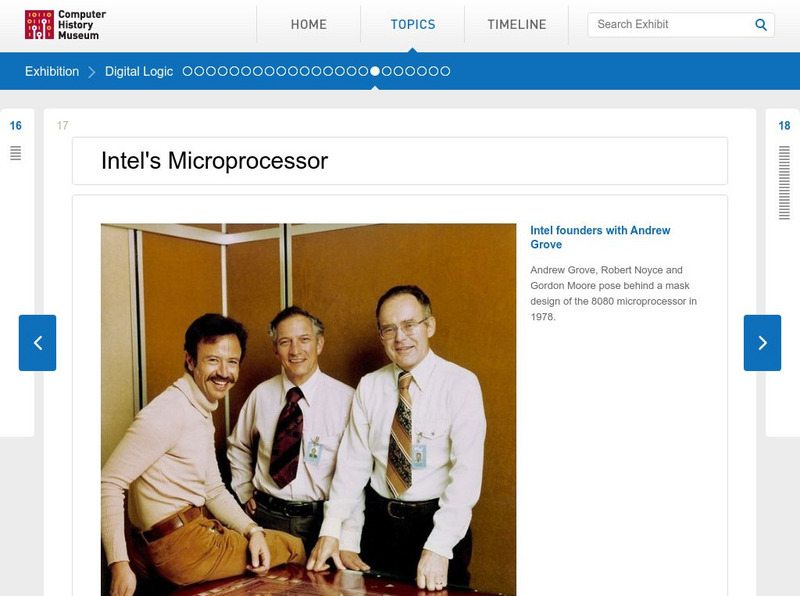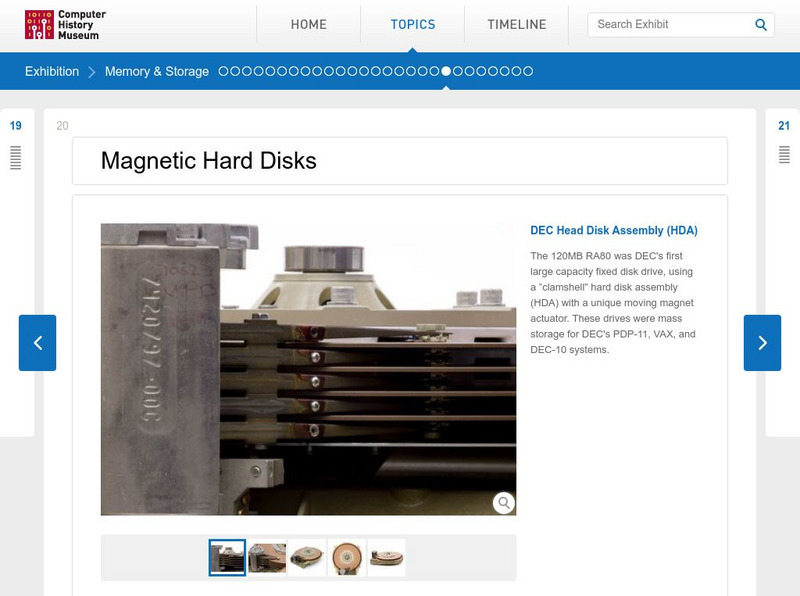TED Talks
Ted: Ted Ed: How Computer Memory Works
In many ways, our memories make us who we are, helping us remember our past, learn and retain skills, and plan for the future. And for the computers that often act as extensions of ourselves, memory plays much the same role. Kanawat...
PC Technology Guide
Pc Tech Guide: System Memory
Use this site to gain a better understanding of computer memory. Detailed information about the cache levels and various types of memory.
Cosmo Learning
Cosmo Learning: Computer Architecture
A series of 38 video lectures on computer architecture by Prof. Anshul Kumar. With comments section at bottom of the page.
Technology Student
Technology Student: Computer Control
This site describes and illustrates the most common hardware components found in a computer.
Science Buddies
Science Buddies: How Many Letters?
Can you remember all of your ABC's? Computers need to "remember" letters too. Every time we use a computer to write a story, the computer needs to "remember" the letters in the story by saving them to the computer's memory as a file. In...
National High Magnetic Field Laboratory
Magnet Academy: Magnetic Core Memory
Magnetic core memory was developed in the late 1940s and 1950s, and remained the primary way in which early computers read, wrote and stored data until RAM came along in the 1970s. (Java tutorial)
National High Magnetic Field Laboratory
Magnet Academy: Magnetic Core Memory 1949
At the dawn of the computer age, magnetic core memory helped make data storage possible, and showed surprising staying power in a field where components are constantly being replaced by new and improved products.
Computer History Museum
Computer History Museum: Core Memory
Brief description of Core Memory, a reliable high-speed storage device developed during the 1950s. The various memory artifacts are on display at the Computer History Museum. This site provides a glimpse into the development of the...
Computer History Museum
Computer History Museum: Williams Tube Memory
Brief description of Williams Tube Memory, the first randam-access memory used by many first generation computers. The various memory artifacts are on display at the Computer History Museum. This site provides a glimpse into the...
Computer History Museum
Computer History Museum: Delay Line Memory
Brief description of Delay Line Memory, a slower serial based design. This site provides a glimpse into the development of the information age from their large collection warehoused in the Computer History Museum located in Mountain...
Computer Hope
Computer Hope: Computer Buying Help
This section of Computer Hope is designed to help users understand and make better decisions when purchasing computer hardware, software and computers. Be sure to review the section 'Buying locations' which gives you tips and what to...
Other
Linda's Computer Stop: Ram, Ram, I Need More Ram
If you need to know about RAM this article is extremely beneficial. The article includes common misconceptions about memory, types of RAM, why you may need more RAM, and how to install RAM.
Khan Academy
Khan Academy: Computer Components
Check your understanding of the flow inside the computer, from the input to the CPU and memory and back to the output, in this set of practice questions designed for AP Computer Science Principles students.
Khan Academy
Khan Academy: What Are the Parts of a Computer?
Each computer receives input from a variety of devices, processes that data with the CPU and memory, and sends results to some form of output. This diagram visualizes that flow.
Curated OER
Google for Education: Children and Technology: Memory and Single Linked Lists
Have your students look at what memory is, in particular how a linked list can be used to represent a list of numbers. Explore linked lists in a game setting.
Computer History Museum
Computer History Museum: I Cs, Microprocessors, & Memory
Brief description of ICs, Microprocessors, and Memory, describing the breakthroughs in technology design that dramatically reduced the size, power requirements, and cost of a computer. The various Integrated Circuit artifacts are on...
Computer Hope
Computer Hope: Computer Printers
A complete guide to computer printers including printers ABCs, types of printers, printer characteristics, printer interfaces, printer fonts, printer resolution, printer memory, printer definitions, and printer troubleshooting.
Other
How Many Bytes in Human Memory?
Most will use the computer as a metaphor for the human brain. But how close can a computer come to what we can do? This is an article that addresses that very question.
Computer History Museum
Computer History Museum: Integrated Circuits
Brief description on the design of Integrated Circuits along with images showcasing the assorted types. The various Integrated Circuit artifacts are on display at the Computer History Museum. This site provides a glimpse into the...
ClassFlow
Class Flow: Computer Concepts
[Free Registration/Login Required] This flipchart identifies basic computer tools and explains their use to the students.
Khan Academy
Khan Academy: Secondary Memory
Types of long term storage of data on the computer and retrieval are examined.
Computer History Museum
Computer History Museum: Magnetic Disks
A brief history covering magnetic disks, developed as efficient random access memory device. Additionally, a discussion on how a disk drive works is provided. The artifacts are on display at the Computer History Museum. This site...
Khan Academy
Khan Academy: Intro to 'Memory'
An introduction to creating a single player version of the memory game using drawing commands and implementing the rules of the game using variables and logic.






















